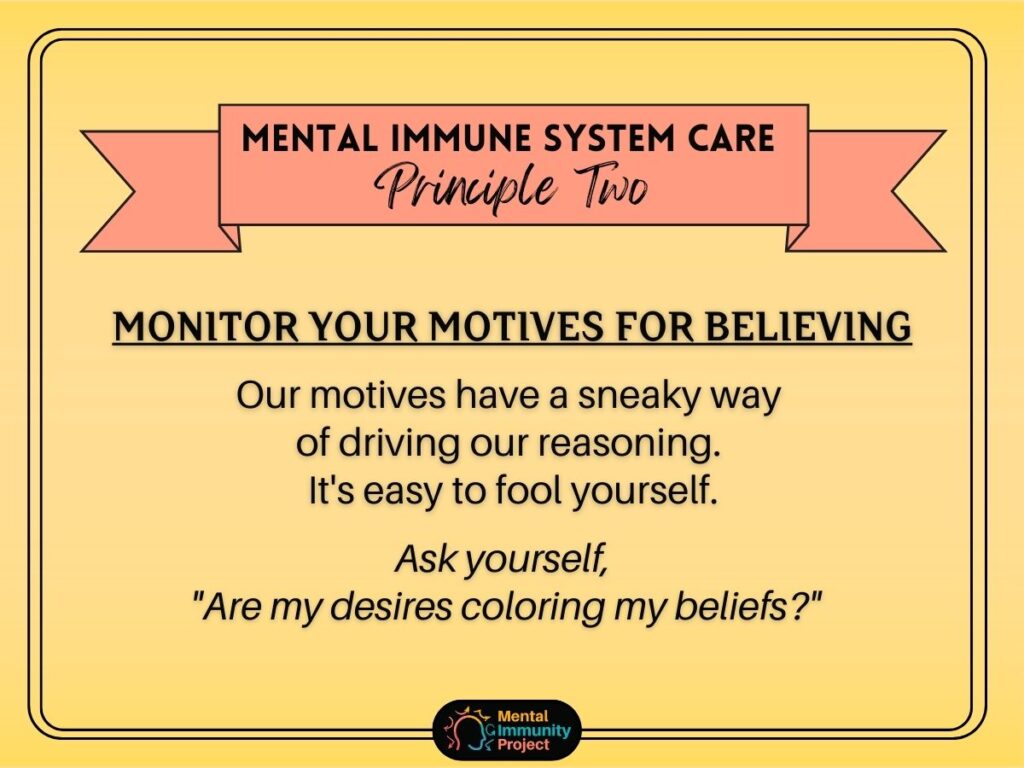How to Build Mental Immunity
The Principles of Mental Immune System Care
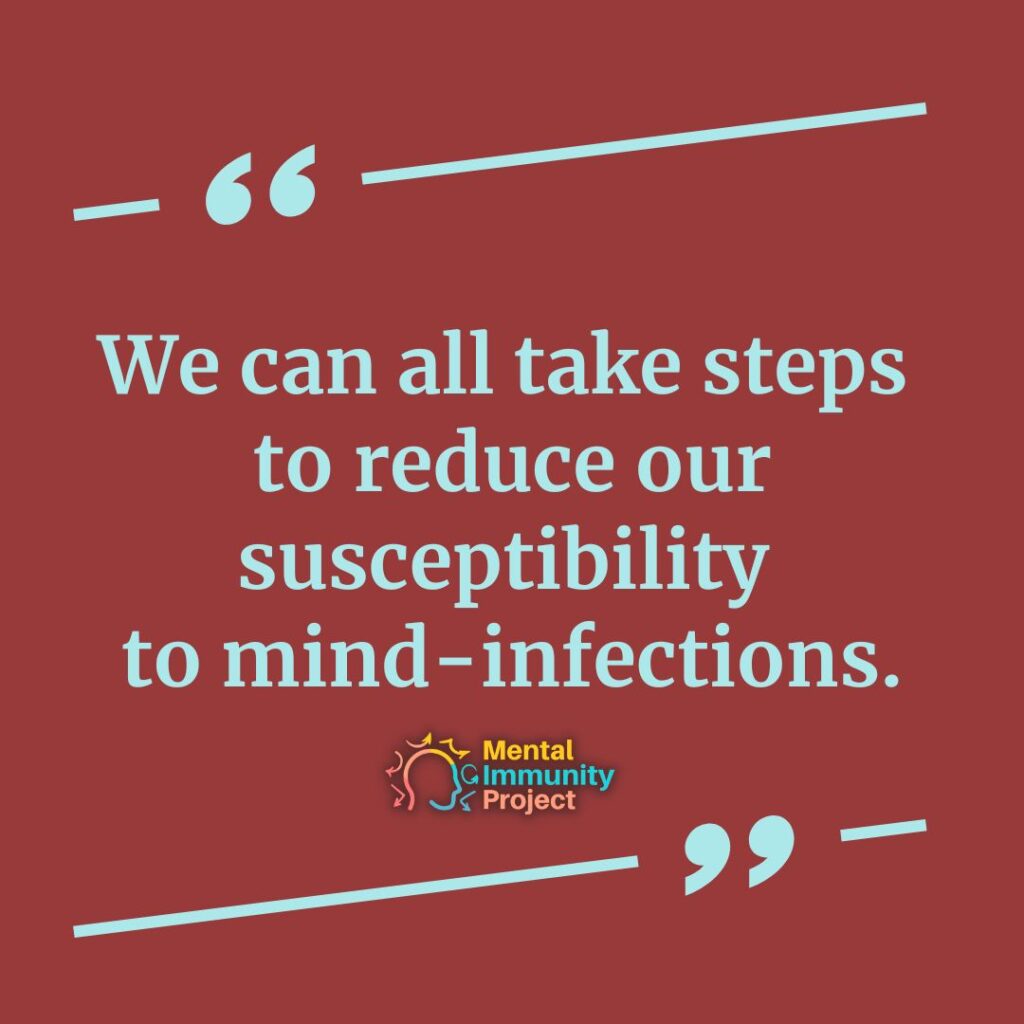
We’re ALL susceptible to mind-infections, and neither intelligence nor education can make you immune. The good news? We can all take steps to reduce our susceptibility. The trick is to keep your mind’s immune system functioning well. This means thinking about your thinking.
The body’s immune system is activated, of course, by germs; the mind’s counterpart is activated by information that conflicts with existing beliefs. Healthy mental immune systems manage such conflict in a particular way: a calm, reflective way that promotes learning, adaptability, and growth. They listen to doubts, consider reasons, seek objective touchstones, and adjust beliefs accordingly.
Digital connectivity made our computers vulnerable to distant hackers. It also networked our minds, exposing them to mind-bugs for which we lack immunity. The following principles will help you care for your mind’s immune system. Put them to work and they’ll protect you from infectious and manipulative information…
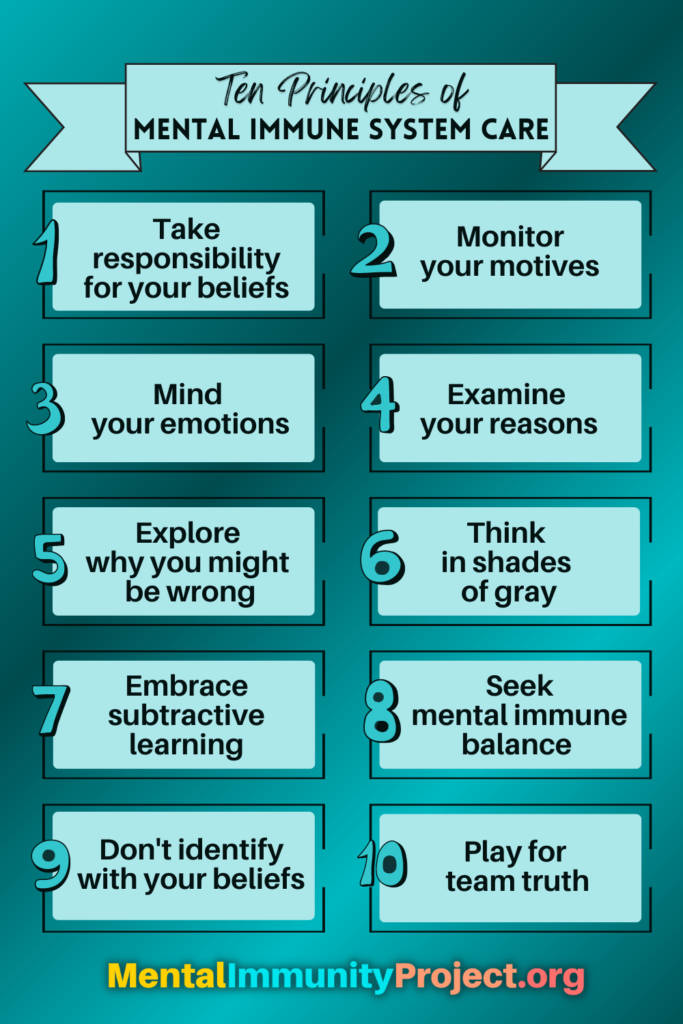
- Agree with these principles? TAKE THE MENTAL IMMUNITY PLEDGE
- Principle 1: Take responsibility
- Principle 2: Monitor your motives
- Principle 3: Mind your emotions
- Principle 4: Examine your reasons
- Principle 5: Explore why you might be wrong
- Principle 6: Think in shades of gray
- Principle 7: Embrace subtractive learning
- Principle 8: Seek immune balance
- Principle 9: Don’t cling to your beliefs
- Principle 10: Play for team truth
- Agree with these principles? TAKE THE MENTAL IMMUNITY PLEDGE
- Conclusion
View our 1-minute videos covering these principles on YouTube and on our Instagram
Agree with these principles? TAKE THE MENTAL IMMUNITY PLEDGE
Principle 1: Take responsibility
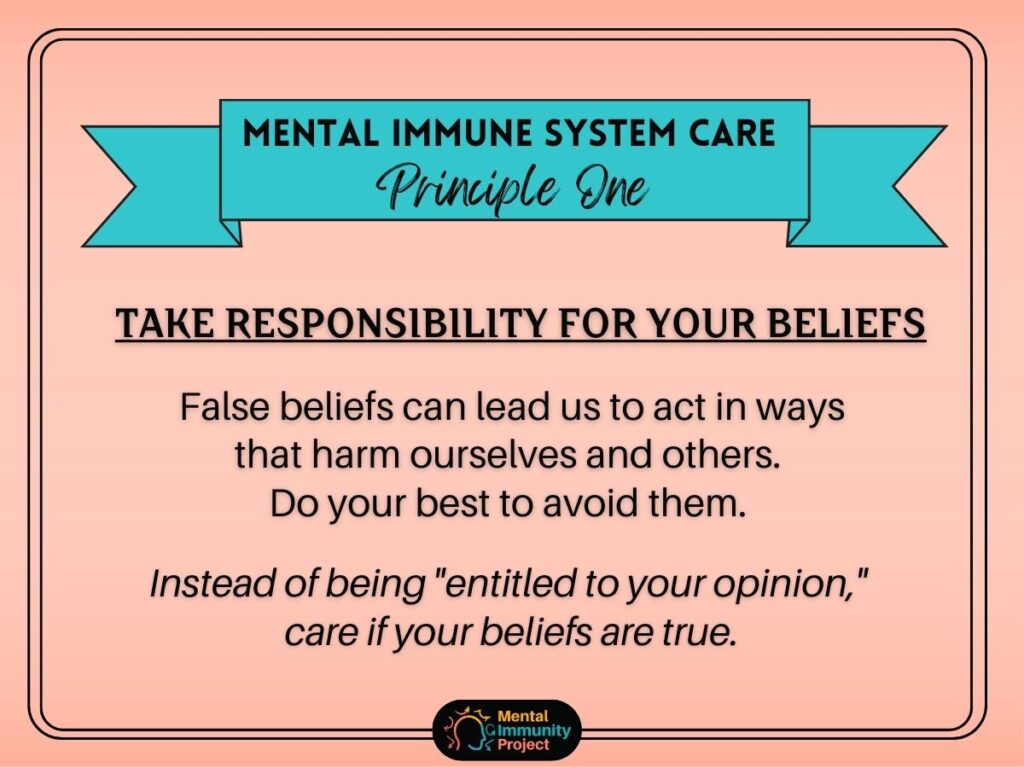
You may have heard someone say they have a “right to believe what they want” or that they’re “entitled to their opinion.” Maybe you’ve said it yourself.
Legally, this is true: in a free society, we have the right to our beliefs. But as Eleanor Roosevelt reminded us, “With freedom comes responsibility.”
Our beliefs drive our behaviors and inform our decisions. Holding false beliefs can cause us to act in ways that cause harm. For example, a parent who believes in homeopathy may deprive their child of life-saving cancer treatment. Believe you can drive drunk and you might very well harm yourself or others.
Our beliefs not only impact us, they can impact those around us, either directly or indirectly. Therefore, we have an obligation to believe responsibly, and to identify and shed problematic beliefs.
Again, it’s not about others telling us what to believe; it’s about us caring if our beliefs are true and helpful. So ask yourself, “What’s the harm, to me and others, if I accept this belief as true?” Consider how others’ beliefs have impacted you, and be the good neighbor you’d like others to be.
Principle 2: Monitor your motives
Sometimes beliefs feel true because they’re useful, gratifying, or advantageous.
But truth and usefulness are different things. And wanting to believe something doesn’t make it true.
While it’s natural to have motives, it’s important to know what they are: motives have a sneaky way of driving our reasoning. Do you stand to gain financially or socially? If so, there’s a decent chance you’re deceiving yourself.
Refusing to accept reality doesn’t change reality, it places you on a collision course with reality. Wanting to believe is powerful, but when we settle for beliefs that are gratifying but false, we almost always end up harming people — ourselves, others, or both.
To determine if there’s something motivating your reasoning, reflect on why you might want to believe (or disbelieve). Ask yourself, “What’s in it for me?” Does the belief bring comfort? Is it necessary to do a certain job or be an accepted member of my social group? Acknowledging your motives for believing can be a powerful way to strengthen your mind’s defenses.
Principle 3: Mind your emotions
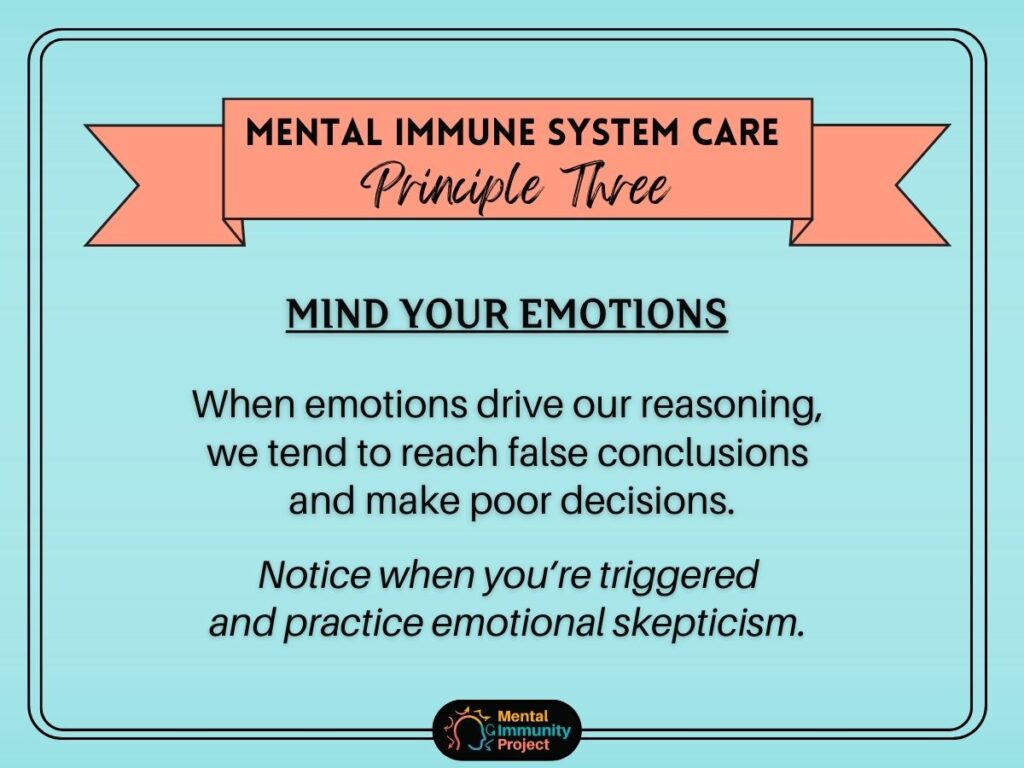
You may have heard someone say, “Facts don’t care about your feelings.” While that’s true, it’s also true that our feelings don’t care about facts.
We humans are emotional creatures. Emotionally engaging stories grab our attention much more than boring statistics. Too often, our emotions drive our reasoning, influence our beliefs, and impact our decision-making.
Any emotion can hijack a mind’s ability to think well, but resentment, fear, and outrage are particularly powerful. Disinformation peddlers are aware of this and use our emotions to manipulate us, often with great success. That’s why emotionally charged content on social media travels farther and faster than dispassionate posts. Ever hear of “angertainment“? It’s widespread today, and a genuine threat to our wellbeing.
Practice emotional skepticism. Notice when you’re triggered and ask whether your emotions might be clouding your judgment. If the answer is ‘yes,’ let them go.
Principle 4: Examine your reasons
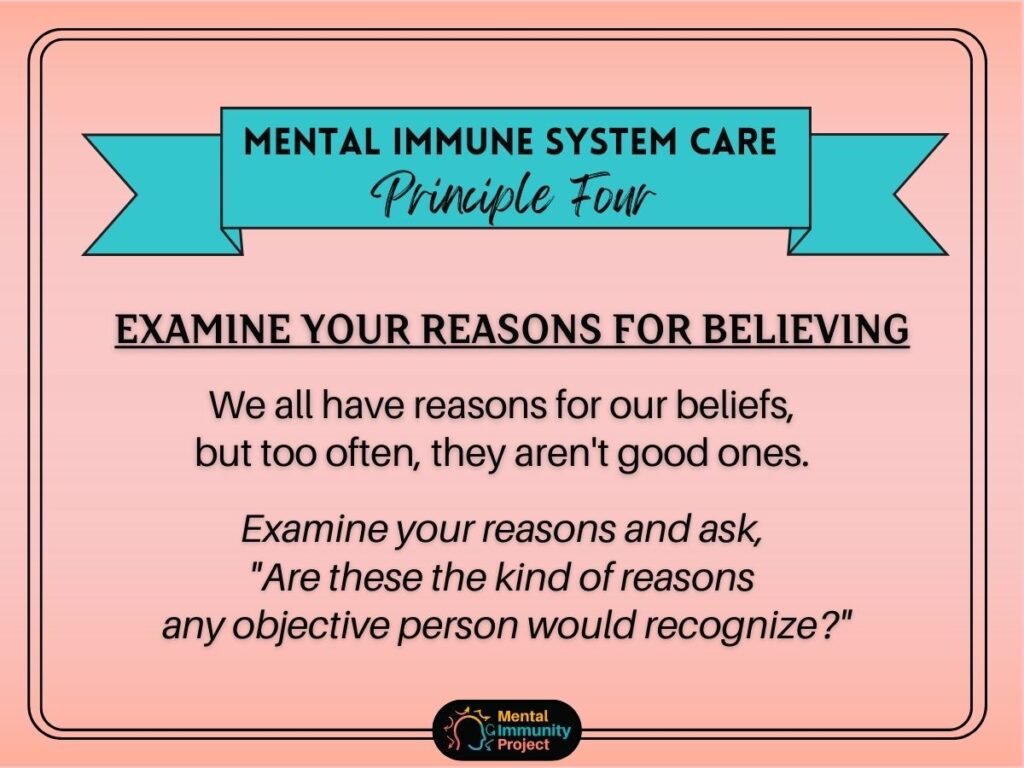
Our reasons for believing can feel like good ones, but often, they’re not as good as we think. With a little effort, you can find “evidence” to support any belief at all!
When emotions drive our reasoning, we form beliefs that feel evidence-based, but are really a product of our desires. The result is false confidence: being wrong but feeling certain that we’re right.
Instead, make a habit of asking yourself: How good are my reasons for believing?
To answer that question, name the evidence and examine it carefully. Where did the belief come from? A personal experience? A friend or family member? A post on social media? And how reliable is the source? Filter evidence that is anecdotal, ambiguous, or irrelevant.
Then ask how else you might explain your experiences. Brainstorm alternative explanations and consider the likelihood of each.
The questions “Do I really know this?” and “How do I know this?” play a big role in the thinking of people with strong mental immune systems. Do yourself a favor and ask these questions frequently!
Principle 5: Explore why you might be wrong
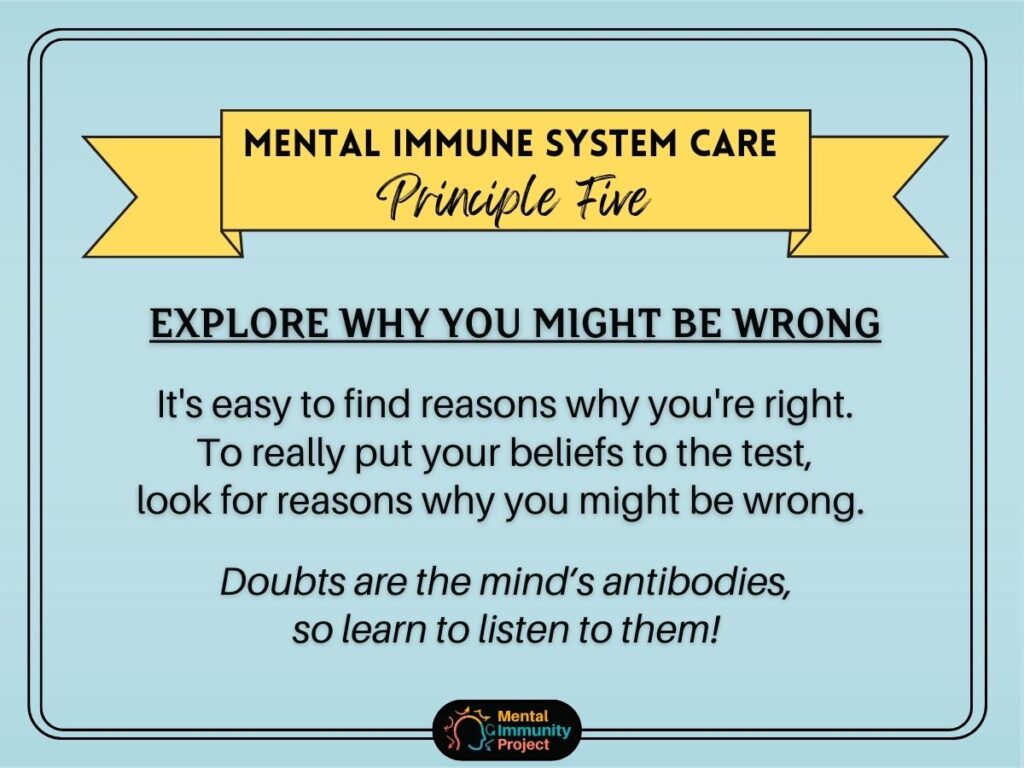
No one is right about everything. The question is, what are we wrong about? And how would we know?
The simple truth is this: it’s not enough to have reasons for your beliefs. Confirmation bias and motivated reasoning are powerful and often result in undeserved confidence.
A better way to assess beliefs involves actively looking for ways you might be wrong. Instead of trying to validate your beliefs, try to invalidate them. Look for evidence that would disprove, not prove. Beliefs should be able to withstand tough questioning, including objections from those who disagree. If it’s true, it will withstand the scrutiny.
Doubts are the mind’s antibodies, generated to fight off problematic information. The little voice in your head that says, “I’m not so sure about this”? Learn to listen to that voice. Lean into your doubts––they’re opportunities to learn.
Principle 6: Think in shades of gray
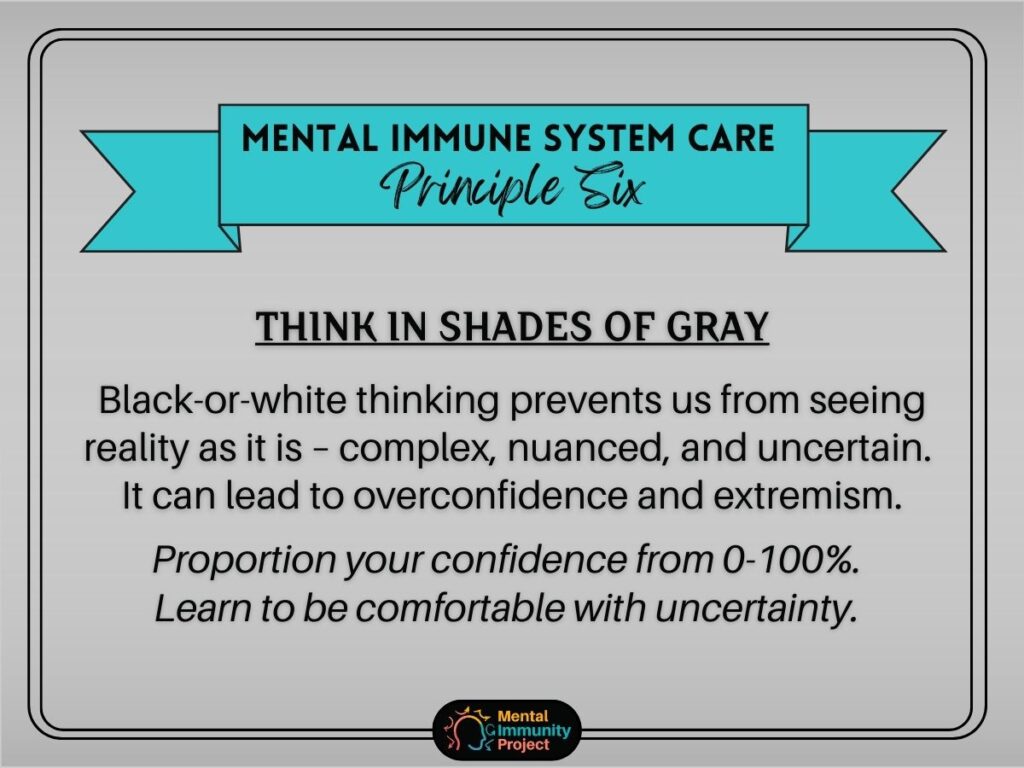
Many of us tune out our doubts because, let’s face it, uncertainty is uncomfortable. Knowing feels better than not knowing.
But reality isn’t black or white; it’s grayscale. And our understanding of it is always limited and flawed. Put this way, it takes a mighty amount of hubris to be completely confident that you know the truth.
The world’s best thinkers proportion their confidence to the evidence. Before relying on a belief, they might ask themselves “How confident am I that this is true?” Then, they might admit to themselves “I’m only about 85% confident here.” Then, as new information comes in, they’ll shift their confidence level up or down.
Importantly, avoid 100% certainty! Not only is certainty an illusion, overconfidence prevents us from learning, and can lead to extremism and dogmatism. Learn to be comfortable with uncertainty. Embrace shades-of-gray thinking. And have the humility to admit that you might not know. Heck, you might even be wrong!
Think about times in the past when you were certain you were right, only to learn later that you were wrong. Ask yourself, “Could I be wrong now? And how would I know?”
Principle 7: Embrace subtractive learning
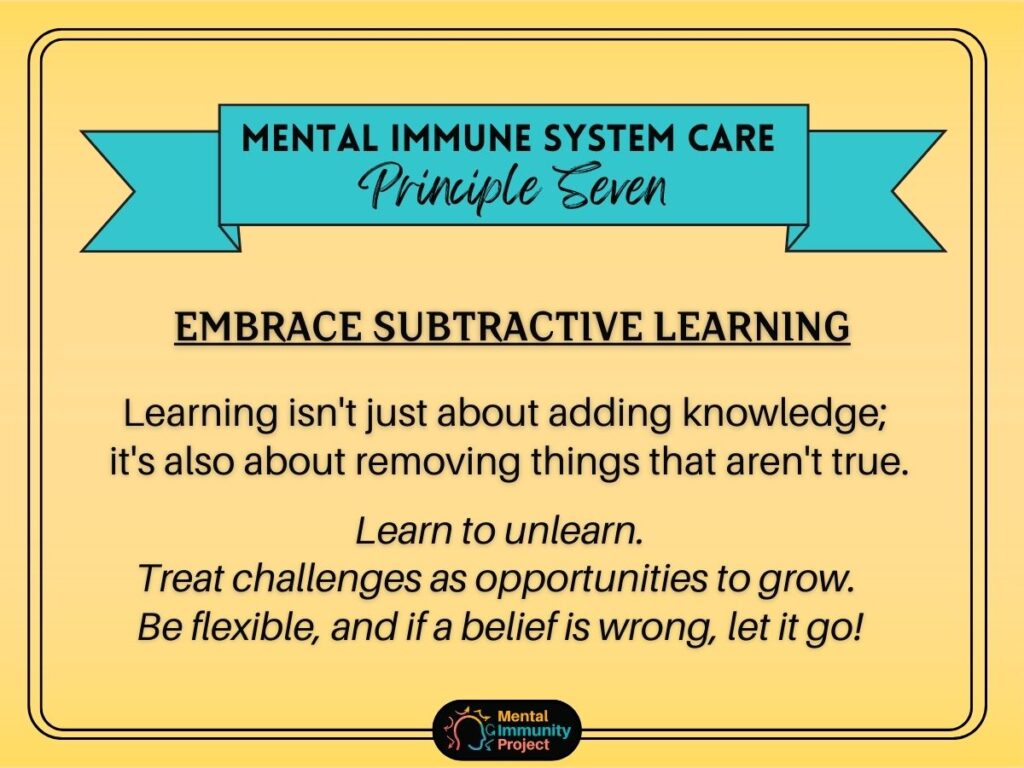
Most of us think of learning as adding to the mind’s knowledge stockpile. But it’s equally important to subtract out the stuff that doesn’t belong. It’s especially important to unlearn beliefs that are false or harmful.
Willingness to modify beliefs with evidence can protect against conspiracy thinking, pseudoscience, and extremism. Conversely, unwillingness to let evidence modify beliefs tends to damage the mind’s immune system. Being able to change your mind is a good thing!
Responsible thinkers let good reasons change their minds — their beliefs, their desires, their feelings, and their behavior. We need to learn to unlearn.
It’s okay to be wrong, okay to not know: we need humility to learn and grow!
The process requires equanimity and courage. Don’t think of challenges as threats; think of them as opportunities — opportunities to unlearn! Notice the conflict, but don’t get defensive. Don’t react, reflect! Be consistently, unflappably curious, and your mind will serve you better.
Ask yourself how it might feel to discover that you are wrong. Might that feeling be coloring your judgment? If you changed your mind, what’s the worst that could happen? Confront your fear of being wrong, and if a belief is poorly evidenced, let it go!
Principle 8: Seek immune balance
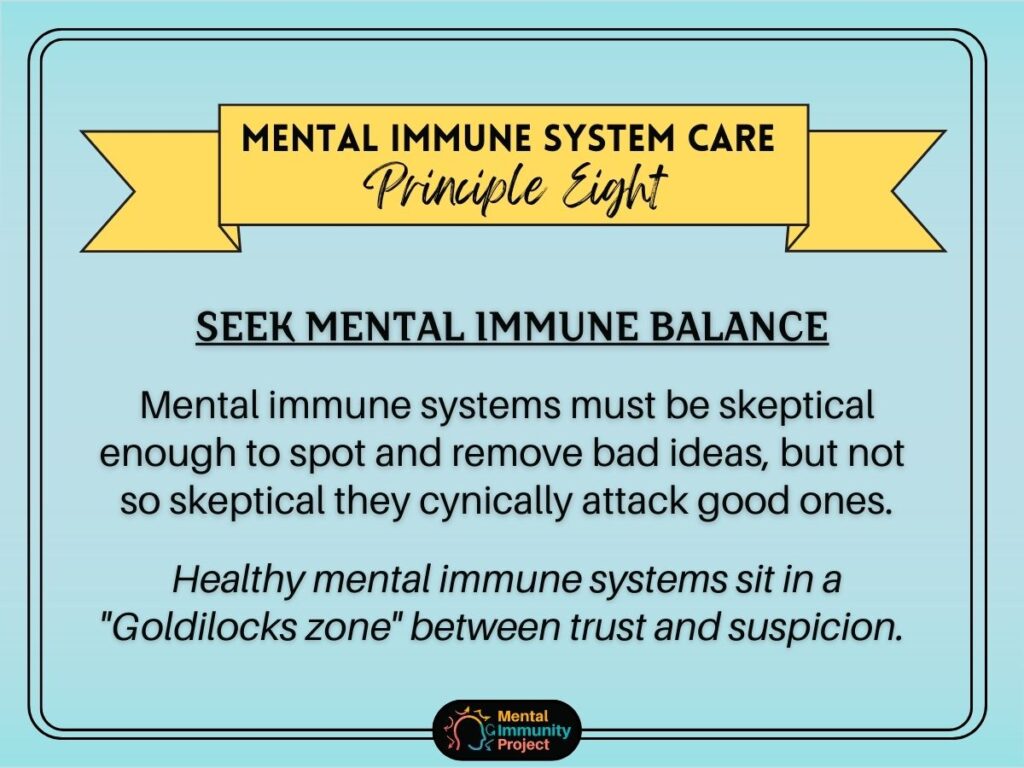
The body’s immune system must strike a delicate balance. It needs to be aggressive enough to fight off harmful intruders, but can’t afford to become over-aggressive and damage the body’s own tissues. The same goes for the mind’s immune system: it must be skeptical enough to spot and remove bad ideas but not descend into hyper-vigilant cynicism.
Healthy immune systems –- both the body’s and the mind’s –- live in a kind of ‘Goldilocks zone’ between trust and suspicion. More precisely, they learn to trust objectively reliable sources and not trust unreliable ones. Outside of this Goldilocks zone, bad ideas can quickly overrun a mind.
Mental immune deficiencies occur when the mind fails to generate the antibodies (doubts, basically) needed to ward off problematic ideas. If you’re too trusting or gullible, bad information will get past your filters.
In contrast, mental allergic reactions occur when the mind’s defenses attack good information to protect problematic beliefs. If you’re too skeptical or critical, good information will get caught in those same filters.
Indiscriminate trust is a bad thing, but indiscriminate suspicion can be even worse; it leads to cynicism, anxiety, and ultimately, nihilism. If you only “think critically” long enough to defeat views you don’t favor, you’re not reasoning, you’re rationalizing.
Remember: “too gullible” is a thing, but “too critical” is also a thing. Open-minded curiosity, healthy skepticism, and intellectual humility can help keep your mind in the sweet spot.
Principle 9: Don’t cling to your beliefs
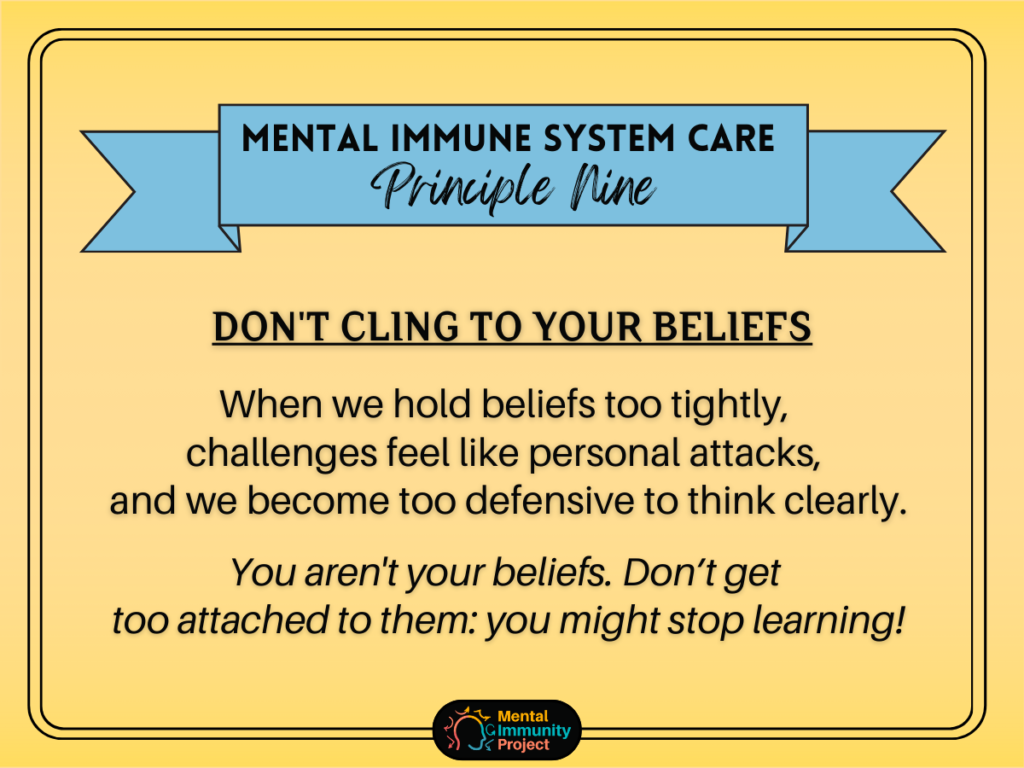
When exploring contentious topics, it’s important to separate who you are from your opinions.
Here’s why: when people tie their identity to a set of views, legitimate challenges to those views trigger an overactive response. Threats to beliefs are taken as personal attacks, provoking a defensive reaction that interferes with learning. When our pride and ego are at stake, it’s very difficult to think well! If you hold your views lightly, challenging questions are less likely to trigger information “allergy attacks” in your mind.
We see this “allergic reaction” response time and time again in politics. People often cling too tightly to their opinions. It’s part of the reason why our society is so politically polarized and why political discussions often go nowhere.
Understand this: you are not your beliefs. Learning to let go of mistaken opinions, inaccurate views, and unhelpful beliefs doesn’t make you weaker; it makes you stronger.
Maintain a gap between your thoughts and your sense of self. Think of beliefs as houseguests that may someday overstay their welcome. Some may remain friends for life (e.g. beliefs in human rights, a God, or the Golden Rule), but it pays to regard ideas as temporary residents in your mind. Just don’t get too attached: you might stop learning!
Principle 10: Play for team truth
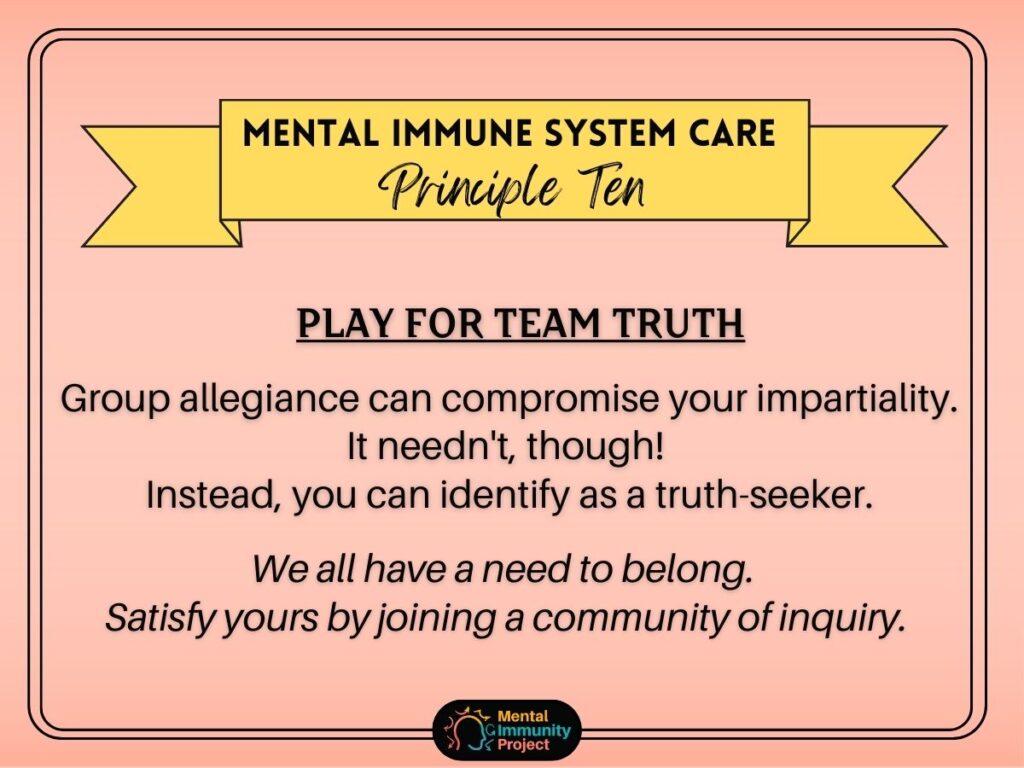
Humans are a social species. We readily divide ourselves into “us” and “them.” Our need to be a part of a community is very real.
Our in-groups are also a source of knowledge, as much of what we think comes down to who we trust. The problem, of course, is that our tribe can be wrong. To maintain our standing, though, we often choose tribe over truth.
That said, our ability to reason collaboratively is arguably humanity’s superpower. None of us can know everything. Plus, we need the help of others to spot our mistakes and blindspots. We can be smarter together than we are individually.
But not all communities approach reasoning the same way.
Communities of belief rally around the group’s ideology. Often, they fight aggressively to defend their beliefs from criticism, and demonize those who disagree. But this is not a reliable method for finding the truth.
By contrast, communities of inquiry are united by a good-faith search for the truth. They keep the emotional stakes low and maintain a collaborative spirit. They allow others to test their beliefs, and treat folks with different points of view as fellow seekers, not opponents. Instead of reasoning to win, inquirers reason to understand. They know reasoning together is not supposed to be a fight; in the end, we’re all on the same team!
Communities of belief are prone to motivated reasoning and their conclusions tend to be skewed by groupthink. Communities of inquiry, however, rally around the process of collaborative idea-testing. Needless to say, when a consensus forms in a community of inquiry, it is usually more trustworthy.
We all have a need to belong. Satisfy yours by belonging to a community of inquiry.
Principle 10 – Watch the Video
All of our videos covering these princip.es are also on our YouTube channel HERE
Agree with these principles? TAKE THE MENTAL IMMUNITY PLEDGE
Conclusion
So there you have it: ten principles for building mental immunity. Make them second nature and your thinking will improve. But don’t stop there! Imagine a world where everyone is taught these things: a world where constructive dialogue is so thoroughly normalized that outbreaks of unreason are rare. Imagine a world where divisive ideologies are routinely dissolved before they can poison the well of mutual trust.
The science of immunology allowed us to do something once thought unthinkable: wipe out smallpox. With the science of mental immunity to guide us, there’s no telling what we’ll accomplish!
